Using the 140 character social media strategy to create buzz around your books and ebooks
Both publishers and authors alike are using Twitter to sell their books online. From contests, to quotes, to reviews, we’ve seen people doing some creative things to get their books talked about on the web.
Here are five examples from five creative authors and publishers:
1. Offer signed copies and try to make it viral
Most recently, Hugh MacLeod of GapingVoid.com launched a social media campaign to sell his new book “Ignore Everybody: and 39 Other Keys to Creativity”.
What started out as a blog series, that turned into a PDF (downloaded over 1M times), soon turned into a 176 page printed book sold online and in bookstores.
A big strategy for MacLeod is to offer “free signed copies” of his book to the first 500 people to order the book online and send him their receipt. It’s a free extra copy, but yes you have to buy it first.
Today, this is his tweet of choice:
2. Respond to people who talk about your book
In fact, consider them testimonials and re-tweet them. @WarrenWhitlock, popular author of Twitter books, often re-tweets nice things said about anything he’s done, including his blogs and books. @Tim_Ash and @JoelComm are other examples of this.
Here is an example:
There’s a whole lot going on in the above tweet. If you need a transcription for it, here it is:
- RT = Re-tweet – Warren is copying and pasting what someone has said about him into his own feed
- #FollowFriday = A “hashtag” for “Follow Friday”, which is twitter tradition for tweeps to recommend other tweeps
- thanks = his response to her tweet
[text_ad]
3. Offer a copy of your book to bloggers on Twitter who are in your niche
All it takes is a simple search for the title of your book on Search.Twitter.com to see if anyone is talking about your niche.
Tim Ash (aka @tim_ash), author of Landing Page Optimization: The Definitive Guide to Testing and Tuning for Conversions is a great example of someone who contacted us when we tweeted that we were looking for Landing Page books to review in a new series.
He sent us a copy of his book and we’re currently in the process of reviewing it.
4. Quote yourself
It might seem tacky, but all a tweet is, is a quote from you, right? John Kremer (aka @JohnKremer), author of 1001 Ways to Market Your Books frequently quotes himself (and others).
As a tip, we’d recommend making it a quote from the book, and then linking to the book itself.
5. Give away a free chapter
@DHampson is a marketer at PeachPit Press, who just today sent out a tweet about a free chapter for one of their books (by @NoeFresh). Then, all of his PeachPit friends re-tweeted the message to all of their followers.
Do you have any great ideas for selling books in 140 characters or less? Let us know in the comments.
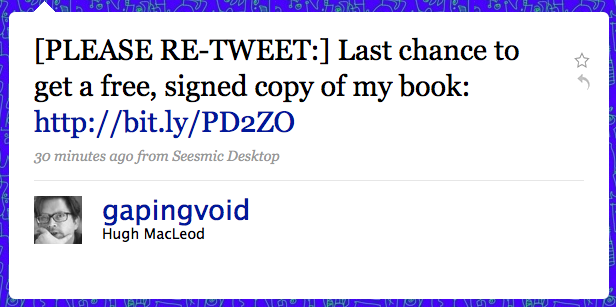
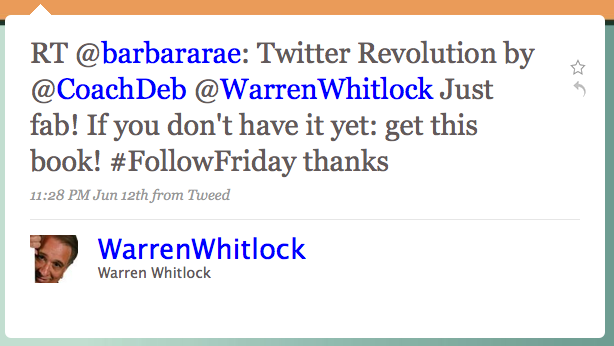
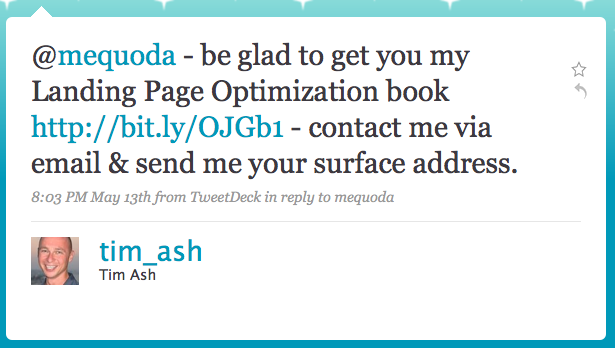
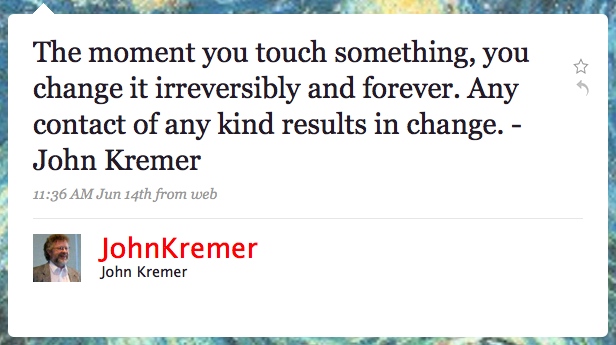
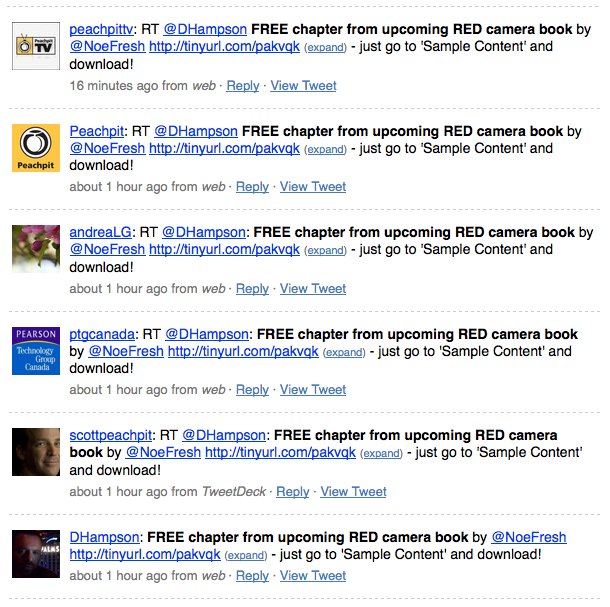



Great ideas! Quoting myself from my own book – what an obvious concept that hadn’t occurred to me. Thanks so much.
All of these are good suggestions; I’ll need to try them out. Here are a couple of things I do to link my web site and blog with my twitter accounts.
I embed my twitter feed (@richardhamilton) into my website, with a link to the feed. That way, readers of the blog can see the feed and click on a link to go to the page and subscribe. WordPress makes this easy to do, and I’m sure other common blog software would let you do the same.
I have a separate account (@xmlpress) for my publishing imprint, so I can keep personal and business information separate (though I frequently RT between the two). That way, my business website only gets business tweets and my personal blog gets personal tweets.
Also, the description in your twitter feed is important. Most folks will look at your description and first page of tweets when they decide whether to follow you. A good description has often made the difference in whether I follow someone or not.